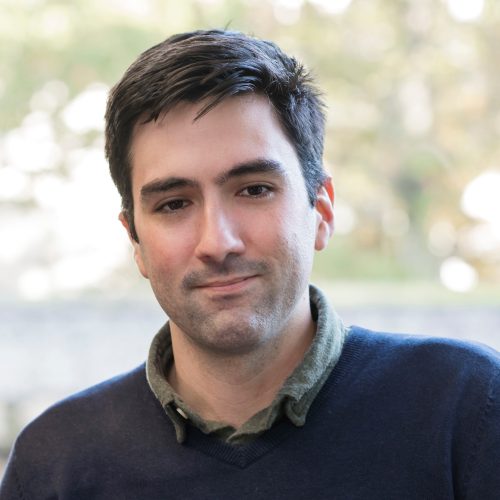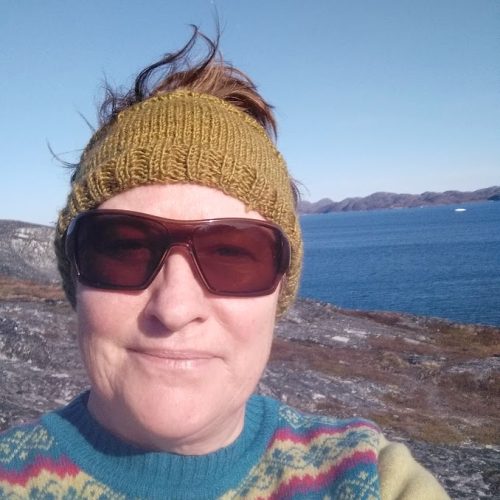Though funded by affiliated institutions, our associated fellows enrich and honour global dis:connect by sharing their ideas, insights and research with us here on site.

Paul Blickle
university of Basel
Paul Blickle is a PhD candidate at the LMU Munich. He received his BA (2017) and MA (2020) in history from the University of Heidelberg and spent a year abroad at the University of Durham and Yale University each. Since 2021, Paul has been working as a research assistant to Roland Wenzlhuemer. From September 2022 to September 2023, he is acting-managing editor of the review journal sehepunkte. Paul’s research interests include maritime history, port cities and steam power in the 19th century.
Paul’s dissertation investigates the global history of ship’s ballast in the 19th century (on ships, in ports, shipyards and markets). Ballast — commercially useless makeweight — served to stabilise ships on the high seas and thus enabled global connection at sea. At the same time, its absence or presence could have considerable dis:connective effects in that the universal need for ballast disrupted the transfer of goods from ship to shore, illegal ballast-dumping silted harbours and estuaries, and the (non)availability of ballast affected shipping routes and trade-patterns.
Click HERE for a list of publications.
Click HERE to email Paul.

Paul Blickle
university of basel
Click HERE to email Paul.
Click HERE for a list of publications.
Paul Blickle is a PhD candidate at the LMU Munich. He received his BA (2017) and MA (2020) in history from the University of Heidelberg and spent a year abroad at the University of Durham and Yale University each. Since 2021, Paul has been working as a research assistant to Roland Wenzlhuemer. From September 2022 to September 2023, he is acting-managing editor of the review journal sehepunkte. Paul’s research interests include maritime history, port cities and steam power in the 19th century.
Paul’s dissertation investigates the global history of ship’s ballast in the 19th century (on ships, in ports, shipyards and markets). Ballast — commercially useless makeweight — served to stabilise ships on the high seas and thus enabled global connection at sea. At the same time, its absence or presence could have considerable dis:connective effects in that the universal need for ballast disrupted the transfer of goods from ship to shore, illegal ballast-dumping silted harbours and estuaries, and the (non)availability of ballast affected shipping routes and trade-patterns.

Lachlan Fleetwood
msca fellow
Lachlan Fleetwood is historian of science, empire, geography and the environment. He completed a PhD at Cambridge and subsequently held fellowships at University College Dublin and Yale. He comes to LMU as a Marie Skłodowska-Curie fellow. His work focuses on the uneven imposition of ostensibly global environmental categories by empires in the long nineteenth century. His research also investigates how geographical features like mountains and deserts can serve as scales for new global histories of science, empire and labour. His first book, Science on the Roof of the World: Empire and the Remaking of the Himalaya, was published by Cambridge University Press in 2022.
At global dis:connect, Lachlan is completing a project titled Imperial science and the habitability of Central Asia and Mesopotamia, 1815-1914: a history of the societal consequences of changing limits. This history of environmental sciences examines ideas of habitability, uninhabitability and climatic determinism in relation to empire, and it traces their postcolonial legacies in the age of climate crisis.
Soon to be updated.
Click HERE to email Lachlan.

Lachlan Fleetwood
msca fellow
Click HERE to email Lachlan.
Soon to be updated.
Lachlan Fleetwood is historian of science, empire, geography and the environment. He completed a PhD at Cambridge and subsequently held fellowships at University College Dublin and Yale. He comes to LMU as a Marie Skłodowska-Curie fellow. His work focuses on the uneven imposition of ostensibly global environmental categories by empires in the long nineteenth century. His research also investigates how geographical features like mountains and deserts can serve as scales for new global histories of science, empire and labour. His first book, Science on the Roof of the World: Empire and the Remaking of the Himalaya, was published by Cambridge University Press in 2022.
At global dis:connect, Lachlan is completing a project titled Imperial science and the habitability of Central Asia and Mesopotamia, 1815-1914: a history of the societal consequences of changing limits. This history of environmental sciences examines ideas of habitability, uninhabitability and climatic determinism in relation to empire, and it traces their postcolonial legacies in the age of climate crisis.

Elisabeth Leake
munich centre for global history
Elisabeth Leake is the Lee E. Dirks Chair in Diplomatic History at the Fletcher School of Law and Diplomacy, Tufts University. She works on decolonisation, the global Cold War and histories of South Asia. Her books include Afghan Crucible: The Soviet Invasion and the Making of Modern Afghanistan (OUP, 2022) and The Defiant Border: The Afghan-Pakistan Borderlands in the Era of Decolonization, 1936-65 (CUP, 2017). She is also chief editor of the Journal of Global History.
Elisabeth is currently undertaking two interconnected research projects. The first, Decolonisation’s discontents, explores the development of different modes of opposition in the aftermath of political independence. The second is a global history of decolonisation, beginning in the late 18th century and ending with the close of the 20th. It interrogates how our understanding of decolonisation, as both idea and practice, shifts by taking a longer, broader historical perspective.
Click HERE for a list of publications.
Click HERE to email Elisabeth.

Elisabeth Leake
munich centre for global history
Click HERE to email Elisabeth.
Click HERE for a list of publications.
Elisabeth Leake is the Lee E. Dirks Chair in Diplomatic History at the Fletcher School of Law and Diplomacy, Tufts University. She works on decolonisation, the global Cold War and histories of South Asia. Her books include Afghan Crucible: The Soviet Invasion and the Making of Modern Afghanistan (OUP, 2022) and The Defiant Border: The Afghan-Pakistan Borderlands in the Era of Decolonization, 1936-65 (CUP, 2017). She is also chief editor of the Journal of Global History.
Elisabeth is currently undertaking two interconnected research projects. The first, Decolonisation’s discontents, explores the development of different modes of opposition in the aftermath of political independence. The second is a global history of decolonisation, beginning in the late 18th century and ending with the close of the 20th. It interrogates how our understanding of decolonisation, as both idea and practice, shifts by taking a longer, broader historical perspective.

kevin ostoyich
spungen foundation
Hailing from Valparaiso University, Kevin Ostoyich has published on German migration, German-American history, historical pedagogy, the Holocaust and the Shanghai Jews. He has been interviewing Holocaust survivors for many years and is frequently invited to speak about the history of the Shanghai Jews around the world.
Kevin’s forthcoming volume, The Herero and the Shanghai Jews: Oral History in Genocide and Refugee Studies, will tell individual stories analyse two little-known groups via oral history. The oral-history approach provides a level of intimacy often missing in standard textbook treatments. The book will explore major themes of commonality and divergence among two groups who have experienced genocide and exile at different points in the twentieth century. The goal is to elucidate how victims relate their experiences across generations, the meanings accorded to the refugee experience, perceptions of commemorative activities and how oral history can illuminate the experiences of genocide and forced migration
Click HERE for a list of publications.
Click HERE to email Kevin.

kevin ostoyich
spungen foundation
Click HERE to email Kevin.
Click HERE for a list of publications.
Hailing from Valparaiso University, Kevin Ostoyich has published on German migration, German-American history, historical pedagogy, the Holocaust and the Shanghai Jews. He has been interviewing Holocaust survivors for many years and is frequently invited to speak about the history of the Shanghai Jews around the world.
Kevin’s forthcoming volume, The Herero and the Shanghai Jews: Oral History in Genocide and Refugee Studies, will tell individual stories analyse two little-known groups via oral history. The oral-history approach provides a level of intimacy often missing in standard textbook treatments. The book will explore major themes of commonality and divergence among two groups who have experienced genocide and exile at different points in the twentieth century. The goal is to elucidate how victims relate their experiences across generations, the meanings accorded to the refugee experience, perceptions of commemorative activities and how oral history can illuminate the experiences of genocide and forced migration

Silke Reeploeg
munich centre for global history
Silke Reeploeg is an Associate Professor at Ilisimatusarfik (University of Greenland) where she teaches in the Department of Cultural and Social history. Her research focuses on memory cultures and hidden histories (including gender history). Other research interests are: critical arctic studies, heritage cultures, micro-historical approaches, and anti-/decolonial perspectives. Before coming to Greenland in 2018 Silke worked at the University of Karlstad, Sweden and the University of the Highlands and Islands in Scotland (based in the Shetland Islands).
Arctic memory cultures are often seen as subject to, rather than active participants in imperial and colonial historical processes and narratives, yet are sites of multiple voices, significant geo-political domains, and concurrent national and colonial identities. Building on recent approaches to anti-/and decolonial perspectives in Arctic memory studies Silke‘s research at global:disconnect explores the relationships that shape cultural memory as an aspect of the coloniality of knowledge. Using both archival and published material, Silke studies the making and remaking of Artic Memory Cultures as both global and transnational memory spaces (Transnationale Erinnerungsorte) – but also shaped by the coloniality of global processes.
Click HERE for a list of publications.
Click HERE to email Silke.

Silke Reeploeg
munich centre for global history
Click HERE to email Silke.
Click HERE for a list of publications.
Silke Reeploeg is an Associate Professor at Ilisimatusarfik (University of Greenland) where she teaches in the Department of Cultural and Social history. Her research focuses on memory cultures and hidden histories (including gender history). Other research interests are: critical arctic studies, heritage cultures, micro-historical approaches, and anti-/decolonial perspectives. Before coming to Greenland in 2018 Silke worked at the University of Karlstad, Sweden and the University of the Highlands and Islands in Scotland (based in the Shetland Islands).
Arctic memory cultures are often seen as subject to, rather than active participants in imperial and colonial historical processes and narratives, yet are sites of multiple voices, significant geo-political domains, and concurrent national and colonial identities. Building on recent approaches to anti-/and decolonial perspectives in Arctic memory studies Silke‘s research at global:disconnect explores the relationships that shape cultural memory as an aspect of the coloniality of knowledge. Using both archival and published material, Silke studies the making and remaking of Artic Memory Cultures as both global and transnational memory spaces (Transnationale Erinnerungsorte) – but also shaped by the coloniality of global processes.

Benjamin Schmidt
munich centre for global history
Ben is the Bridgman Professor of History at the University of Washington. His work sits at the crossroads of cultural history, visual and material studies, and the history of science. He focuses chiefly on Europe’s engagement with the world in the first age of globalism. His books include Innocence Abroad: The Dutch Imagination and the New World, winner of the RSA Gordan Prize, and Inventing Exoticism: Geography, Globalism, and Europe’s Early Modern World, finalist for the Kenshur Prize. His most recent book, The Globalization of Netherlandish Art (with T. Weststeijn), is forthcoming this year.
Ben’s gd:c project focuses on global ‘things’ — material artifacts that can be literally grasped — and ways they dis:connect early modern global cultures. It analyses materials and material technologies that served as critical intermediaries in an earlier age of global entanglement — media that mediated, as it were, transcultural transactions. In Munich, he’ll be working on a set of carved coconut cups, enlisted to probe the possibilities of ‘decorative colonialism’: a heuristic device to understand how empire was materially consumed by early modern Europeans.
Click HERE for a list of publications.
Click HERE to email Benjamin.

Benjamin Schmidt
munich centre for global history
Click HERE to email Benjamin.
Click HERE for a list of publications.
Ben is the Bridgman Professor of History at the University of Washington. His work sits at the crossroads of cultural history, visual and material studies, and the history of science. He focuses chiefly on Europe’s engagement with the world in the first age of globalism. His books include Innocence Abroad: The Dutch Imagination and the New World, winner of the RSA Gordan Prize, and Inventing Exoticism: Geography, Globalism, and Europe’s Early Modern World, finalist for the Kenshur Prize. His most recent book, The Globalization of Netherlandish Art (with T. Weststeijn), is forthcoming this year.
Ben’s gd:c project focuses on global ‘things’ — material artifacts that can be literally grasped — and ways they dis:connect early modern global cultures. It analyses materials and material technologies that served as critical intermediaries in an earlier age of global entanglement — media that mediated, as it were, transcultural transactions. In Munich, he’ll be working on a set of carved coconut cups, enlisted to probe the possibilities of ‘decorative colonialism’: a heuristic device to understand how empire was materially consumed by early modern Europeans.

Philipp W. Stockhammer
LMU
Philipp W. Stockhammer is a professor of prehistoric archaeology focussing on the Eastern Mediterranean at the LMU Munich and co-director of the Max Planck-Harvard Research Center for the Archaeoscience of the Ancient Mediterranean at the Max Planck Institute for Evolutionary Anthropology in Leipzig. He has received an ERC Starting Grant (2015), an ERC Consolidator Grant (2020) and is a PI of collaborative research projects on the Bronze and early Iron Ages from Central Europe to the Eastern Mediterranean. His research focuses on transculturality, social practices and the integration of archaeological and scientific data concerning social belonging, mobility, food and health.
In my research, I focus on the dis:connectivities I confront as a (pre-) historian: the transformative power of dis:connectivity in the past and the challenge of narrating the past between othering and nostrification. I link ground-breaking new datasets in our narratives with postmodern lines of thinking in archaeology. In my research, I reflect upon dis:connectivity in the Bronze Age, i.e. the first globalised period in world history. While analysing the role of those actors in the past, I aim to find a way to narrate their history – despite neither knowing their names nor their feelings and emotions, aware that those aspects are crucial for enabling present actors to dis:connect with the past.
Click HERE for a list of publications.
Click HERE to email Philipp.

Philipp W. Stockhammer
LMU
Click HERE to email Philipp.
Click HERE for a list of publications.
Philipp W. Stockhammer is a professor of prehistoric archaeology focussing on the Eastern Mediterranean at the LMU Munich and co-director of the Max Planck-Harvard Research Center for the Archaeoscience of the Ancient Mediterranean at the Max Planck Institute for Evolutionary Anthropology in Leipzig. He has received an ERC Starting Grant (2015), an ERC Consolidator Grant (2020) and is a PI of collaborative research projects on the Bronze and early Iron Ages from Central Europe to the Eastern Mediterranean. His research focuses on transculturality, social practices and the integration of archaeological and scientific data concerning social belonging, mobility, food and health.
In my research, I focus on the dis:connectivities I confront as a (pre-) historian: the transformative power of dis:connectivity in the past and the challenge of narrating the past between othering and nostrification. I link ground-breaking new datasets in our narratives with postmodern lines of thinking in archaeology. In my research, I reflect upon dis:connectivity in the Bronze Age, i.e. the first globalised period in world history. While analysing the role of those actors in the past, I aim to find a way to narrate their history – despite neither knowing their names nor their feelings and emotions, aware that those aspects are crucial for enabling present actors to dis:connect with the past.

Callie Wilkinson
msca fellow
Callie Wilkinson studies the dramatic expansion of the British Empire in the eighteenth and nineteenth centuries and its sociocultural impact at home and abroad. In previous research projects conducted at Cambridge and the University of Warwick, she has examined how the idea of indirect rule was contested within the British East India Company as well as the contemporary debates on the extent to which information about the Company should be disseminated to the public.
At global dis:connect, Callie is investigating how Company soldiers’ testimony affected broader discourses about the Company’s military operations in an age before professional war correspondents.
Click HERE for a list of publications.
Click HERE to email Callie.

Callie Wilkinson
msca fellow
Click HERE to email Callie.
Click HERE for a list of publications.
Callie Wilkinson studies the dramatic expansion of the British Empire in the eighteenth and nineteenth centuries and its sociocultural impact at home and abroad. In previous research projects conducted at Cambridge and the University of Warwick, she has examined how the idea of indirect rule was contested within the British East India Company as well as the contemporary debates on the extent to which information about the Company should be disseminated to the public.
At global dis:connect, Callie is investigating how Company soldiers’ testimony affected broader discourses about the Company’s military operations in an age before professional war correspondents.






